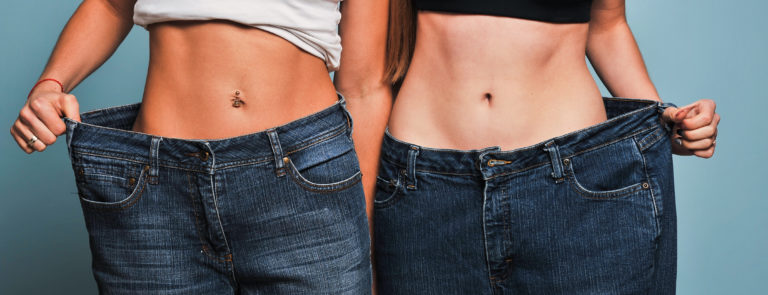15% off £30 OR 20% off £40
Code:DECIDE
Should I diet during perimenopause? 6 tips for effective long-term weight loss

Feeling frustrated by the weight changes that come with perimenopause? We asked a physiologist how to hack your hormones to manage weight successfully in midlife
Summary
1Why do women tend to notice weight gain
Changes to your body shape are normal and natural during this life phase. Around 50% of women gain weight during perimenopause...,
2Why doesn’t crash dieting work
Crash diets like Atkins and juice fasts might deliver quick results, but they often lead to weight gain in the long run...
36 tips for losing weight sustainably
From lifting those weights to stocking your fridge on protein-rich snacks...
Weight gain is a common concern during perimenopause, and when unexpected changes happen, it’s tempting to chase quick fixes and crash diets that promise instant results.
But, while calorie cutting might help you initially shed pounds, it’s not a lasting solution. In fact, around 80% of these diets fail, with the lost weight often creeping back on over time.1
“The key to managing weight during perimenopause isn’t about fad diets and deprivation; it’s about understanding how hormonal changes impact your body and then applying sustainable lifestyle changes that bring about real change,” says physiologist Dr Emma Ross.
To help you on your way, she shares her golden rules for approaching perimenopausal weight management in a safe and sensible way.
Why do women tend to notice weight gain during the perimenopause years?
Changes to your body shape are normal and natural during this life phase. Around 50% of women gain weight during perimenopause, often up to 10 kilos – about a stone and a half, or roughly one dress size.2 3 This is down to several key factors...
Hormonal changes
As oestrogen levels drop during perimenopause, it’s common to notice an increase in fat, particularly around the abdomen area. “Oestrogen helps give women their curvy shape,” explains Dr Ross. “When those levels decrease, it alters fat distribution, often leading to a loss of waist definition and more fat around the midsection.”
Loss of muscle mass
“Starting around age 35, both men and women begin to lose muscle tissue as part of the natural ageing process,” notes Dr Ross. This muscle loss can slow down your metabolism, making it harder for your body to burn calories efficiently.4

Other lifestyle factors
Add to the mix unhealthy eating while on-the-go, a busy lifestyle that leaves you time-poor, poor sleep from night sweats and a drop in exercise as you get older, and it’s easy to see why weight gain in midlife can be a complicated issue, influenced by a mix of health and lifestyle choices and changes.
Why doesn’t crash dieting work during perimenopause?
Crash diets like Atkins and juice fasts might deliver quick results, but they often lead to weight gain in the long run. “When you drastically cut calories, you lose both fat and muscle,” Dr Ross explains.
“Muscle is important because it burns more calories at rest than fat does. So, when you lose muscle, your metabolism slows down, meaning your body burns fewer calories overall. This makes it easier to regain weight when you go back to your normal eating habits.”
On top of this, changes to hormones during perimenopause can compound weight gain, making it harder to stay trim. “Fluctuations in oestrogen can affect how your body stores and lays down fat, especially around the tummy area,” she adds.5
The takeaway here? Quick fixes aren’t effective in these years. “What worked in your 20s might not yield the same results now,” says Dr Ross. “Instead of dieting harder, it’s about establishing lifelong habits which keep you healthy and which you can continue to do as a matter of course, without feeling deprived, restricted or unnaturally hyper-focused on what you are eating.”
6 tips for losing weight sustainably during perimenopause
1. Aim for a small calorie deficit
“Crash diets which slash your intake to as little as 1,200 calories a day are neither healthy nor sustainable,” notes Dr Ross. If you’re looking to lose weight safely, the British Menopause Society recommends aiming for a more gentle 500 calorie daily deficit, which can help you lose around a pound per week.
Instead of obsessing over the calorie content in each ingredient, focus instead on manageable tweaks like trimming portion sizes, sticking to regular mealtimes and being mindful of all-day snacking.
“Consistent weightlifting is one of the best ways to both build muscle and boost your metabolism”
2. Pick up some weights
“For women in perimenopause and menopause, resistance training is a must if you want to lose weight and reshape your body composition,” says Dr Ross.
“Research has found that consistent weightlifting is one of the best ways to both build muscle and boost your metabolism, so you burn more calories at rest.”6
A recent 2023 study7 on 41 healthy middle-aged women found that a 20-week resistance training programme both significantly increased muscle mass and reduced fat in the participants who were transitioning through perimenopause.

3. Don’t cut the carbs
As the body’s main source of energy, carbs have been found to be essential8 for managing symptoms during the perimenopause period, especially if you’re upping the intensity of your exercise routine with strength training.
“Cutting carbs from your diet can speed up muscle loss, which you definitely want to avoid,” says Dr Ross.
Focus on swapping refined carbs like white bread and pasta for whole grains such as quinoa and brown rice. “Whole grains are higher in fibre, which keeps you fuller for longer,” Dr Ross notes.
4. Jump on the oat milk bandwagon
If you’re a habitual coffee drinker, consider switching to low-fat milk or plant-based dairy alternatives like oat milk. “Lowering saturated fat also helps to support heart health,” explains Dr Ross.
“Just make sure you’re still getting essential nutrients like calcium and vitamin D from other sources.”
As a blanket rule, the British Menopause Society recommends a daily vitamin D supplement of 10mcg (400 IU) for all women in perimenopause to keep bones strong and healthy.2
5. Load your fridge with protein-rich snacks
Sugary snacks like sweets and biscuits can give you energy when you’re flagging, but the buzz crashes just a few hours later, leading you to crave another high-calorie hit.
To get off the all-day rollercoaster, think about introducing some protein-rich options instead. “Protein helps reduce cravings and maintain muscle mass, which helps us to maintain a healthy metabolism,” says Dr Ross. Greek yoghurt with nuts, a boiled egg or hummus with veggie sticks are all great between-meal choices.
6. Schedule booze-free days
As tempting as it is to round off the day with a large glass of wine when perimenopause symptoms hit hard, those extra calories can add up fast.
“Alcohol can add to weight gain, and it can disrupt your metabolism and sleep too,” warns Dr Ross. If you enjoy the ritual of unwinding with an evening tipple, try replacing your post-work nightcap with a sugar-free kombucha or alcohol-free beer.
“Staying healthy is a marathon, not a sprint”
How to stay positive about your weight during perimenopause
If managing weight during perimenopause feels overwhelming, focus on incorporating one healthy habit at a time, like adding regular strength training sessions into your week, before tackling other changes.
While your GP could help with discussions around the symptoms of perimenopause and how to manage them, they might not always have the specific insights needed for navigating weight and hormonal changes during perimenopause. A dietitian with expertise in this area can offer targeted advice and strategies to get you back on track. With the right support, you can see changes to your health and wellbeing that last.
What’s next?
“Staying healthy is a marathon, not a sprint,” assures Dr Ross. If things don’t go as planned, just reset and keep moving forward.
For more ideas on taking care of your body during this changing time, check out Does perimenopause cause belly fat – and what can I do to combat it?
The advice in this article is for information only and some of the information reflects the opinion of our in-house nutritionist and should not replace medical care. Please check with your GP or healthcare professional before trying any supplements, treatments or remedies. Food supplements must not be used as a substitute for a varied and balanced diet and a healthy lifestyle.
- Hall KD, Kahan S. Maintenance of Lost Weight and Long-Term Management of Obesity. Medical Clinics of North America [Internet]. 2018;102(1):183–97. Available from: https://www.ncbi.nlm.nih.gov/pmc/articles/PMC5764193/
- BRITISH MENOPAUSE SOCIETY Tool for clinicians Information for GPs and other health professionals Menopause: Nutrition and Weight Gain [Internet]. Available from: https://thebms.org.uk/wp-content/uploads/2023/06/19-BMS-TfC-Menopause-Nutrition-and-Weight-Gain-JUNE2023-A.pdf
- Study S. Changes in Body Composition and Weight During the Menopause Transition - SWAN - Study of Women’s Health Across the Nation [Internet]. SWAN - Study of Women’s Health Across the Nation. 2019. Available from: https://www.swanstudy.org/changes-in-body-composition-and-weight-during-the-menopause-transition/
- Volpi E, Nazemi R, Fujita S. Muscle tissue changes with aging. Current opinion in clinical nutrition and metabolic care [Internet]. 2004;7(4):405–10. Available from: https://www.ncbi.nlm.nih.gov/pmc/articles/PMC2804956/
- Lizcano F, Guzmán G. Estrogen Deficiency and the Origin of Obesity during Menopause. BioMed Research International [Internet]. 2014;2014. Available from: https://www.ncbi.nlm.nih.gov/pmc/articles/PMC3964739/
- Krzysztofik M, Wilk M, Wojdała G, Gołaś A. Maximizing Muscle Hypertrophy: A Systematic Review of Advanced Resistance Training Techniques and Methods. International journal of environmental research and public health [Internet]. 2019 Dec 4;16(24):E4897. Available from: https://www.ncbi.nlm.nih.gov/pmc/articles/PMC6950543/
- Eduard Isenmann, Kaluza D, Havers T, Elbeshausen A, Geisler S, Hofmann K, et al. Resistance training alters body composition in middle-aged women depending on menopause - A 20-week control trial. BMC Women’s Health. 2023 Oct 6;23(1).
- Mohsenian S, Shabbidar S, Siassi F, Qorbani M, Khosravi S, Abshirini M, et al. Carbohydrate quality index: Its relationship to menopausal symptoms in postmenopausal women. Maturitas [Internet]. 2021 Aug 1 [cited 2021 Dec 3];150:42–8. Available from: https://pubmed.ncbi.nlm.nih.gov/34274075/
















